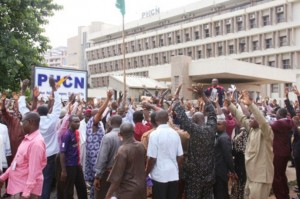Beyond PHCN, Power Minister makes bold Transformation Moves
The Minister for Power, Professor Barth Nnaji, has been a busy man. Beyond the mere rhetoric and lip service applied by many government ministers in bringing about transformation, the Professor has gone a step further in order to bring stability and sanity to the Power sector.
On December 31, 2011, the liquidation of PHCN, Nigeria’s state holding company for Power assets, was executed. The minister has also withdrawn funding for the Abuja headquarters of the organization as the PHCN is no longer considered a market participant.
The minister also issued a directive for the redeployment of staff to PHCN successor companies, explaining it is not a redundancy or displacement exercise but merely a routine transfer.
As to be expected, members of the liquidated PHCN staff reacted negatively to the change and have begun protesting the decision to be redeployed to state offices.
The Power Ministry issued a statement that should be respected by all stakeholders in the industry in order to lead Nigeria out of perennial darkness.
The statement issued on Wednesday, is reproduced below:
The Minister of Power, Prof. Bart Nnaji, wishes to offer the following clarifications regarding the existence and status of the Power Holding Company of Nigeria (PHCN) and its staff.
1. The staff of the Power Holding Company of Nigeria (PHCN) at the corporate headquarters in Abuja are being redeployed to its successor companies, following the winding up of PHCN with effect from 1st January 2012.
2. This exercise is therefore a routine transfer of staff and not a displacement or redundancy exercise that could warrant any form of anxiety or protest.
3. The regulatory agency has already directed that no further funds be made available to the PHCN corporate headquarters since it is not a market participant with effect from 1st January 2012. Therefore staff who choose to remain in the former PHCN corporate headquarters building – rather than proceed forthwith to the companies to which they have been redeployed – would find that there is no work to do in the building and that there is nobody to pay them at the end of the month for doing nothing in that building.
4. For the record, the Electric Power Sector Reform (EPSR) Act, 2005 empowers the National Council on Privatisation (NCP) to incorporate an initial holding company within six months of the coming into force of the Act. This holding company would assume the staff, assets and liabilities of the defunct National Electric Power Authority (NEPA). This was how PHCN came into being.
5. The NCP was also mandated (Section 8) to create a number of successor companies which will assume PHCN staff, assets and liabilities. This was to be done within eight months after the incorporation of PHCN. Subsequently, NCP created six (6) generation, one (1) transmission and 11 distribution companies, in addition to other marketing, bulk purchase, and liability asset management companies.
6. The EPSR Act (Section 7) also mandates the Nigerian Electricity Regulatory Commission (NERC) to issue an interim licence to PHCN which shall be valid for a period of not more than 18 months. NERC duly issued this licence in 2006 for the period required by law. What this means is that, by law, PHCN should have ceased to exist by 2007.
7. Finally, under Section 10, this law stipulates that not later than one year after the creation of successor companies, NCP shall issue a binding order to PHCN to transfer its remaining employees, assets, liabilities, rights and obligations to the successor companies.
8. The PHCN has been issued with this transfer order by the authorities, which has occasioned the current transfer of PHCN corporate headquarters staff not only to the various successor companies but also to the parent ministry and other agencies of government where their services would be required.
9. These processes are without prejudice to prior agreements reached with the workers on their entitlements, including the 50% salary increase which government has graciously granted the workers. The transferred workers shall enjoy their enhanced salaries, benefits and allowances in whichever successor company to which they have been redeployed.
10. In particular, workers should note that their 50% salary increase arrears for June, July and August 2012, plus their transfer allowances and their January allowances will be paid at their new stations.
Related Posts
Latest News
-
FCMB Bank (UK) Limited Launches Personal and Business Banking Proposition to Deepen Inclusiveness
FCMB Bank (UK) Limited, an independently incorporated subsidiary of First...
- Posted August 1, 2018
- 0
-
The Worrisome Trend of Sensational Social Media “Journalism” and the Impact On Legitimate Business Concerns: Recent Travails of FCMB, GTBank and First Bank
On June 25, 2018 I woke up to yet another...
- Posted June 26, 2018
- 0
-
FCMB attains ISO Certification for Quality Management
Leading financial services provider, First City Monument Bank (FCMB), has...
- Posted May 16, 2018
- 0
-
Over 1,000 firms bid for 2017 railway projects
Over 1000 companies expressed interest in 17 categories of projects...
- Posted October 20, 2017
- 2
-
NAICOM moves to enforce compulsory insurance of public buildings
To drive the enforcement of the compulsory insurance of public...
- Posted October 20, 2017
- 11
-
Reps ask NPA to reverse termination of agreement with Intels
The House of Representatives yesterday waded into the ongoing controversy...
- Posted October 19, 2017
- 1
-
SEC suspends Oando shares from stock market
The Securities and Exchange Commission has ordered the Nigerian Stock...
- Posted October 19, 2017
- 1
-
FCMB Bank (UK) Limited Launches Personal and Business Banking Proposition to Deepen Inclusiveness
FCMB Bank (UK) Limited, an independently incorporated subsidiary of...
- August 1, 2018
- 0
-
The Worrisome Trend of Sensational Social Media “Journalism” and the Impact On Legitimate Business Concerns: Recent Travails of FCMB, GTBank and First Bank
On June 25, 2018 I woke up to yet...
- June 26, 2018
- 0
-
Azman Air commences flight operation in Sokoto
Azman Air Thursday commenced flight operation to Sokoto state....
- February 21, 2015
- 424
-
NRC increases Lagos goods trains, eyes fuel haulage
The Nigerian Railway Corporation says it has increased its...
- June 23, 2016
- 100
 Nigeria News
Nigeria News
- Keyamo to launch Enugu Air July 7
- Adada state creation justified, long overdue – Nwodo, Ezea, others
- Enugu ex-guber candidate, Ogbodo charges coalition to rescue Nigeria
- WAFCON 2024: Ajibade declares Super Falcons ready for battle
- Lagos-based man allegedly defrauds Trump’s 2025 inauguration fund of N460 million







